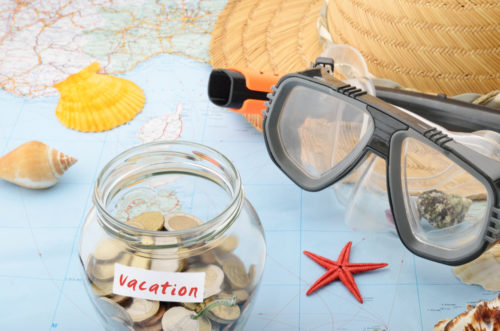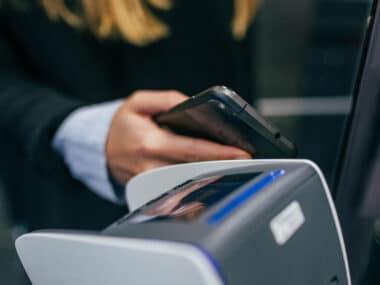Enjoying the brief experience of an overseas trip to Europe or a Caribbean cruise is hardly worthwhile if your car is repossessed a few months later because you can’t afford to make the payments. Simply put, a vacation isn’t worth it if it comes at the expense of future financial distress.
These tips are aimed at helping you budget in that summer holiday or spring break trip right alongside your car payment, mortgage, and all of your other financial responsibilities.
Table of Contents
Create an Annual Vacation Budget
If you’re like most families, you probably aim for one big vacation each year. However, if you wait until a few weeks or even a few months beforehand to start setting aside money, you’re going to fall woefully short when those big-ticket expenses start rolling in.
Rather than procrastinating, it’s wise to set aside a predetermined amount of your income throughout the year. This enables you to save up the required funds before you ever have to buy plane tickets, book hotel rooms, or pick up a new passport.
Here are a few things you should have in mind as you go about setting your vacation budget:
Determining Your Vacation Savings Goal
If you’re going to save for your vacation ahead of time, the first thing you need to figure out is how much you should save in the first place. Saving $100 per month may sound great until you find out that your annual vacation is going to cost you $7,500.
On the other hand, saving hundreds or thousands of dollars more than is necessary means you’re misdirecting funds that could go towards paying off debts or saving for retirement or establishing a child’s college fund.
Start by outlining what you want your vacation to look like. Are you thinking of heading to a regional resort for the weekend or do you want to go all-out on that once-in-a-lifetime trip to DisneyLand? You don’t need to plan every detail — especially if it’s still a year away — but getting a rough idea of the size and scope of your upcoming festivities is a good place to start.
At this early point, you’ll also want to consider how much money you can realistically save. After all, budgeting out a $25,000 vacation isn’t the best idea if you make $45,000 per year.
Expenses to Consider
Once you have the outline of your vacation in mind, you can begin to come up with your budget. Consider what needs to be saved in order to avoid both an overly restrictive vacation and one that is so lavish it leaves you in acute financial distress.
As you begin to tally up the total, try using something like Google Destinations to help you get a rough idea of the costs associated with a trip.
It can also be helpful to come up with a list of your potential expenses. Here are a few things you’re going to want to consider:
- Accommodations: Where do you plan on staying? A five-star hotel is going to be a significant increase in costs compared to a family’s house, AirBnB, or even a KOA campground.
- Currency exchange costs: Are you heading overseas? Make sure to consider the costs associated with exchanging your currency.
- Meals and snacks: This is an easily overlooked, yet critically important factor, as unconsidered food costs can quickly eat up your budget. Estimate the cost of three meals a day (times the number of days you want to travel) plus any drinks and snacks you may want to have in between the main courses.
- Cost of activities: Are you going to be paying for entrance fees, tickets, or day-passes? Four $50 tickets to a concert alone instantly adds $200 of expenses onto your budget. Make sure to consider these items in your calculations.
- Activity-specific gear: Do you need to purchase or rent any gear to participate in activities? This could be anything from a new swimsuit to rock climbing gear, kayaks, bicycles, or even a jersey of your favorite sports team and some tailgating equipment.
- Wi-Fi or phone costs: While hardly a concern in our day-to-day lives, the costs of Wi-Fi and cell phone access can be prohibitive in certain areas, especially if you’re traveling internationally.
- Transportation costs to reach your destination: Whether you’re talking about airfare, cruise tickets, or gasoline and vehicle maintenance expenses, you’re going to want to count the cost of getting to and from your destination.
- Transportation once you get to your destination: How do you plan on moving around once you arrive? Account for rideshare charges, car rental costs, or any other transportation fees.
Include a Savings Buffer
As you pull together your official estimated costs, make sure to add a savings buffer to the overall total. This will help you handle any expenses that are above what you may have expected.
Say, for instance, you’re taking two adults and three children to Virginia Beach for a four-day weekend. You calculate your food costs to be $85 per family meal plus $45 per day for snacks and drinks.
That totals $1200 for food over the course of four days. It would be wise to save at least 10% to 15% more than that — or between $1320 and $1380 — in order to account for any higher food costs that you may incur.
Tools to Budget for and Plan a Vacation
After a while, your head is going to start spinning with all of the numbers and lists. Fortunately, there are many tools that can help you plan your vacation.
Family Vacation Planner
Examples.com has an excellent series of vacation planner templates that can bring a sense of order and organization to your plans. The site provides free versions of:
- A family vacation planner.
- A student vacation planner.
- An itinerary planner.
- A daily action planner.
A planner can be a great way to organize all of the information included so far in one easy-to-understand format.
Tips to Save Money While on Vacation
Just because you’ve studiously saved money all year doesn’t mean you should recklessly blow it all while you’re on vacation. Here are a few tips to help you keep the costs down:
Avoid Impulse Purchases
It’s tempting to let loose while on vacation, and that okay in moderation. However, if you find that you’re dropping money at the slightest excuse, you may want to reevaluate your vacation budgeting process.
Remember, you’ve spent time painstakingly creating a budget and carefully setting aside cash for your trip. You made sure that there was enough to enjoy yourself without feeling like you were scrimping by, and you even beefed up your savings with a 10% to 15% buffer. You should be able to make extraneous purchases from time to time without acting impulsively.
Cook Your Own Meals
Meals can be a very expensive part of a budget. While flights can get below $100 these days, paying for a family of five to eat over a single weekend can cost hundreds upon hundreds of dollars.
While you don’t need to avoid eating out entirely, it can be wise to cook your own meals occasionally. Taking the time to cook your own food can help free up more of your vacation budget for other uses. A few tips to help this go smoothly include:
- Use a microwave, refrigerator, or stovetop to cook meals in your hotel room.
- Visit a local grocery store to get staple foods at a fraction of the cost of a restaurant entree.
- Pack food to bring with you whenever possible.
- Transition to two larger meals per day and lean on affordable snack options to fill in the gaps.
- Look for hotels that offer a decent complimentary breakfast each morning.
Be Flexible
Finally, remember that flexibility is a money-saver. If you’re willing to make a trip to a specific destination during the off-season, for instance, it can save you a lot of money. Airfare may be cheaper, tickets could be more affordable, and you may be able to find special pricing for your accommodations.
Another option is to look for special deals with restrictions. For example, a Groupon deal might save you 50% on a hotel room that isn’t booked as often, or a cruise ship might provide a steep discount for smaller, interior cabins that aren’t as popular.
Flexibility may make some options significantly more affordable, as long as you’re willing to adjust your expectations accordingly.
Image Source: https://depositphotos.com/





